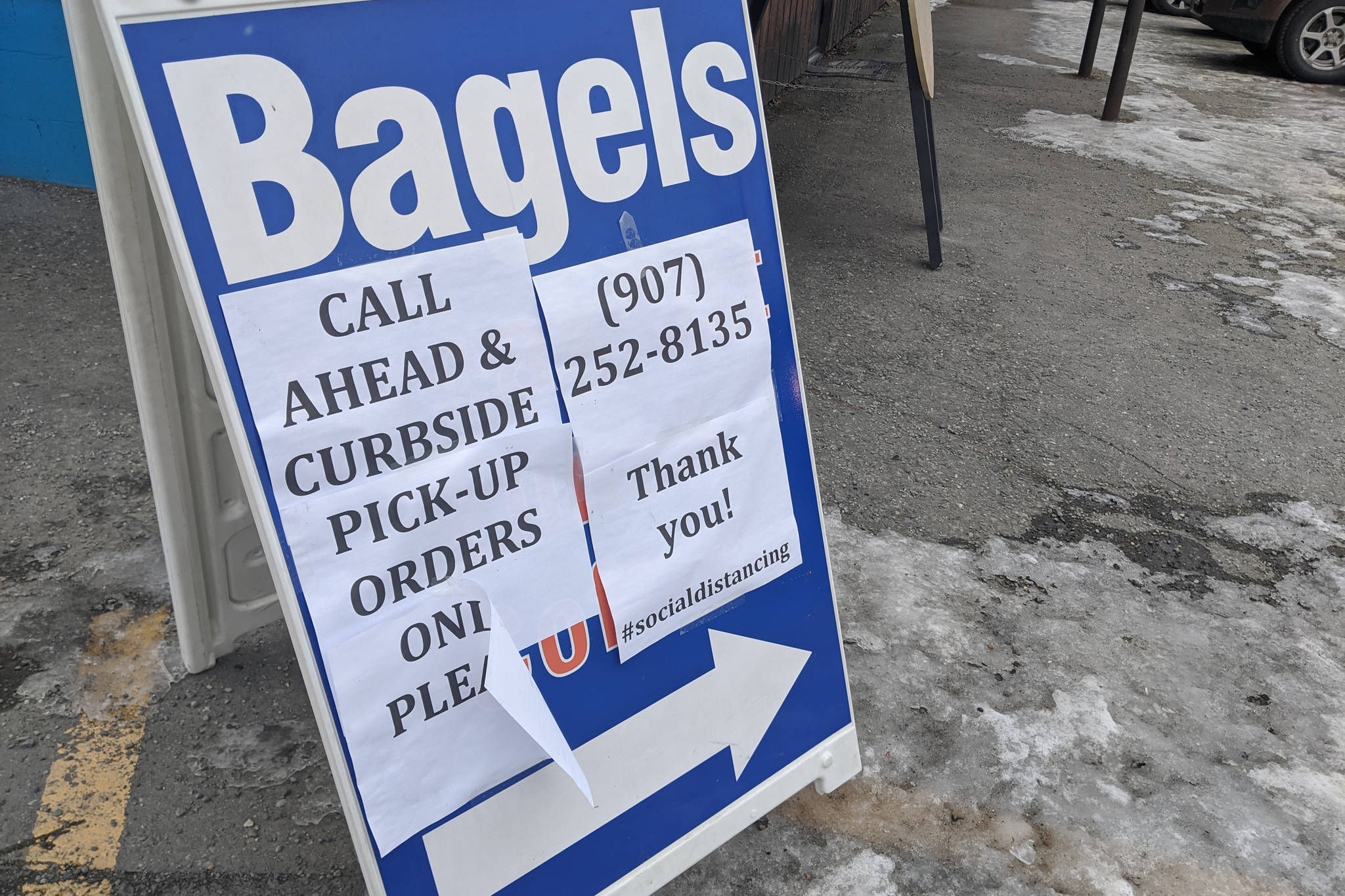Starting Friday, Alaska restaurants will be able to offer limited dine-in services, and retail stores and personal care services will be able to operate at limited capacity.
During a Tuesday press conference, Gov. Mike Dunleavy rolled out phase one of what he called a five-phase process to reopen Alaska’s economy, which will involve rolling back some of the different health mandates that have been issued in response to the COVID-19 outbreak.
“For those that have been chomping at the bit to get things open and moving: we’re heading there,” Dunleavy said on Tuesday. “For those that are still very concerned, and rightfully so, we can assure you that we are going to continue to use the best practices and we are going to continue to use the data, just like we did from the moment we received that aircraft from Wuhan, China.”
Dunleavy said that each decision made during this process will be constantly monitored by the state, and if it is determined that the reopening of a certain sector of the economy led to a surge in new cases, that decision will be rescinded.
Phase one of the governor’s plan rescinds certain aspects of some health mandates while extending others. Adam Crum, commissioner of the Alaska Division of Health and Social Services, said on Tuesday that most nonessential businesses will reopen at limited capacity starting Friday, April 24.
Phase One: What can reopen?
Restaurants will be allowed to offer dine-in service at 25% capacity, with customers limited to one household per table and at least 10 feet between each table. Crum said that restaurants are encouraged to use outdoor seating, reservations and continued takeout and delivery service to limit foot traffic.
Retail businesses will be allowed to open, but only one individual per family is allowed inside the stores at a time.
Personal care services, including hair salons, barbers, nail salons and massage parlors can only serve one client at a time, and businesses cannot have clients in their waiting rooms.
Other nonessential businesses, including professional business services and engineering firms, will be allowed to operate on a limited basis.
Fishing charters will be allowed to operate with one family unit per boat. Charters can also take mixed family units, but only at 25% capacity.
Gyms will be allowed to hold outdoor classes only and are limited to groups of fewer than 20 people.
Groups of fewer than 20 people can now get together for religious services, weddings and other social gatherings.
Those attending the group gatherings must maintain a distance of 6 feet from one another.
Entertainment venues, which include bars, movie theaters, bowling alleys and bingo halls as defined in Health Mandate 3, will remain closed.
Mandate 10, which limits international and interstate travel, has been extended to May 19.
Mandates 11 and 12, which limit intrastate travel and encourage social distancing, have both been extended until further notice.
Crum said that the specifics of Phase One will be available on the state’s website by Wednesday.
COVID-19 in Alaska: By the numbers
There are 329 total cases of COVID-19 that have been confirmed in the state as of Tuesday at noon, which includes eight new cases since Monday. Of those, 168 people have fully recovered, including seven new recoveries reported Tuesday, while nine have died from the disease. There have been 36 total hospitalizations due to COVID-19, which includes people who have died and people who have been discharged. There were no new deaths or hospitalizations reported Tuesday.
The eight new cases announced on Tuesday are from four Alaska communities: Anchorage (four), Juneau (two), Eagle River (one) and Ketchikan (one). Of the new cases, six are men and two are women. One is aged 10-19, four are aged 20-29, two are aged 50-59 and one is aged 60-69.
On the Kenai Peninsula, 19 people have tested positive for COVID-19 in the following communities: Anchor Point (one), Homer (two), Kenai (four), Seward (three), Soldotna (six) and Sterling (three). This includes an Anchor Point resident who died while out of state and a Homer resident who was tested and treated in Anchorage.
The Anchorage municipality has 160 residents who have confirmed positive for COVID-19, which includes four Chugiak residents, eight Eagle River residents and three Girdwood residents. In the Fairbanks North Star Borough, 63 Fairbanks residents have tested positive, as well as 15 North Pole residents and one additional resident of an unspecified community within the borough. In the Matanuska-Susitna Borough, Wasilla has 10 cases and Palmer has 19. In the Southeast, Juneau has 26 cases, Ketchikan has 16, Petersburg has three and Craig has two. Delta Junction, Nome, Bethel, Kodiak and the Yukon-Koyukuk Census Area each have one case. Communities with fewer than 1,000 residents are included in the total for their borough or census area but not individually reported.
More than 12,000 tests for COVID-19 have been conducted in the state of Alaska, Chief Medical Officer Dr. Anne Zink said on Tuesday.
Locally, this includes 276 tests conducted at Central Peninsula Hospital, with 238 coming back negative, six positive and 32 pending results. South Peninsula Hospital has conducted 190 tests as of Tuesday, with 177 coming back negative, one positive, and 12 pending results.
COVID-19 resources
For the latest information on the health mandates issued by the state, visit https://covid19.alaska.gov/health-mandates.
For the latest information about COVID-19 local to the Kenai Peninsula Borough, visit the Borough’s website at kpboem.com
For the latest statewide data on COVID-19, visit the Alaska Coronavirus Response Hub at https://coronavirus-response-alaska-dhss.hub.arcgis.com.
For the latest guidance from the Centers of Disease Control and Prevention on how to prevent the spread of COVID-19, visit the CDC website at https://www.cdc.gov/coronavirus.
For the latest international updates on COVID-19, visit the website for the World Health Organization at www.who.int.

